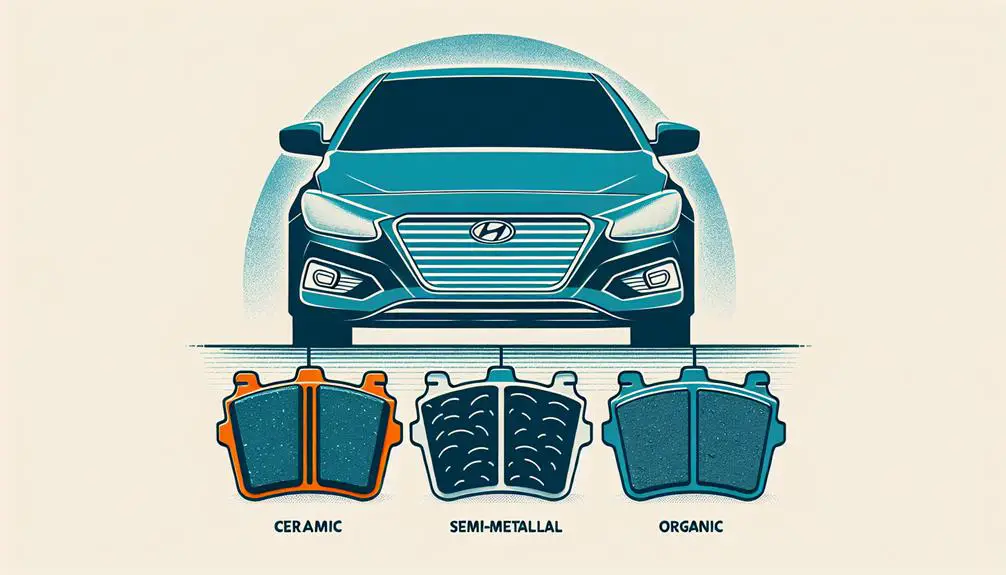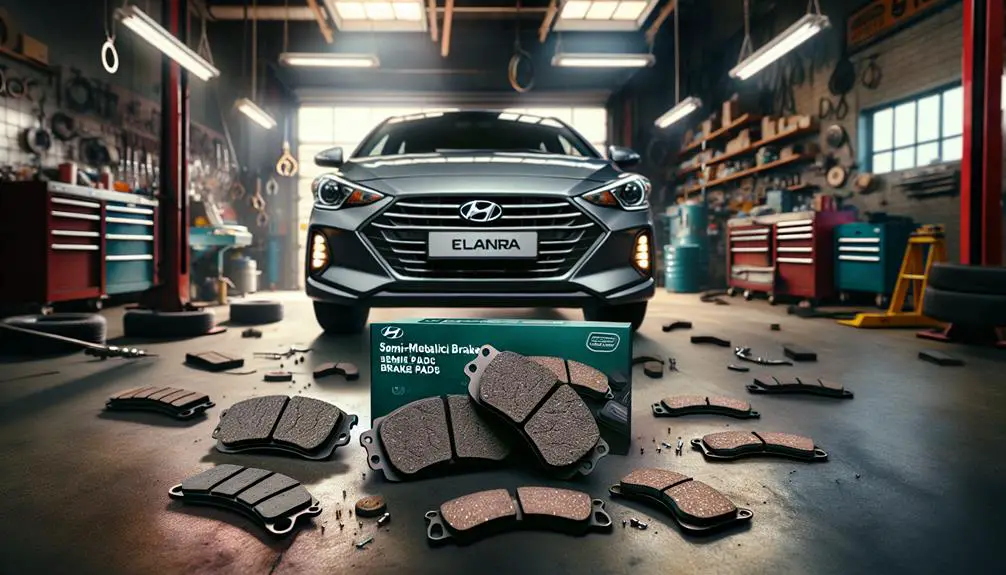The best brake pads for a Hyundai Elantra vary depending on driving style, but ceramic pads are often a top choice for their balance of performance, noise level, and durability.
Exploring the world of brake pads for your Hyundai Elantra is crucial, akin to selecting the ideal pair of shoes for a marathon, emphasizing the necessity of finding the perfect match for both performance and comfort.
When searching for new brake pads, you're likely to come across ceramic, semi-metallic, and organic variants, each with unique advantages and disadvantages that affect aspects such as longevity, noise, and cost.
In the ensuing discussions, we aim to elucidate these distinctions, offering insights on premier options that not only meet your vehicle's requirements but also align with your driving preferences.
We shall delve into what distinguishes these choices, underscoring the importance of a prudent selection to conserve both time and resources in the future.
Understanding Brake Pad Types

To guarantee your Hyundai Elantra stops safely, it's crucial to understand the three main types of brake pads: ceramic, semi-metallic, and organic. Each type offers distinct advantages and fits different driving styles and environments.
Initially, let's discuss semi-metallic brake pads. They're crafted from a mixture of metals like steel and iron, blended with fillers and a binding agent. They're excellent for performance driving since they handle high temperatures well, making them less prone to fading during heavy use. However, they're a bit noisier and can wear down your rotors faster than other types.
Following up are organic brake pads, alternatively known as non-asbestos organic (NAO) pads. These are crafted from a blend of fibers and materials like rubber, glass, and carbon, bound together with a resin. Organic pads are quieter and softer, resulting in less stress on your Elantra's rotors. They're most effective for everyday driving but tend to wear out quicker and aren't as effective in extreme driving conditions or in wet weather.
Ceramic brake pads, which we'll explore more deeply another time, offer a middle ground between durability and performance. They're made from ceramic fibers, nonferrous filler materials, and sometimes small amounts of metal. These pads deliver excellent braking performance, generate less dust and noise, and are more durable than organic pads. However, they're typically the most expensive option.
Selecting the appropriate brake pads depends on your driving requirements, budget, and preferences. Consider these factors carefully to ensure you're making the best decision for your Hyundai Elantra.
Top Ceramic Brake Pads
Several high-quality ceramic brake pads stand out for your Hyundai Elantra, offering unmatched durability and performance. When you're in the market for brake pads, you'll find that ceramic options provide a quieter, cleaner driving experience. They produce less brake dust compared to other types, keeping your wheels cleaner for longer.
One of the best ceramic brake pads for the Elantra is the Akebono ProACT Ultra-Premium Ceramic Brake Pad Set. Known for its environmentally friendly design, this set ensures reduced brake noise and minimal dust production. You'll appreciate the smooth, responsive braking, which significantly enhances your driving safety and comfort.
Another excellent choice is the Bosch QuietCast Premium Ceramic Brake Pads. Bosch incorporates advanced aerospace alloy into their ceramic formula, offering superior stopping power without the sacrifice of noise or longevity. These pads come with a rubber core multilayer shim that provides increased strength and insulation against noise, making your rides as quiet as they're safe.
Finally, the Wagner ThermoQuiet Ceramic Brake Pads stand out for their unique one-piece design, which helps in reducing vibration and noise. Additionally, their proprietary ceramic formulations extend pad life and improve stopping performance, ensuring you're getting a high-quality product that's built to last.
Choosing the right ceramic brake pads can dramatically improve your Hyundai Elantra's braking performance. Not only do you get a quieter, cleaner ride, but you also benefit from the durability and safety that these high-quality products provide. So, consider these options to make sure you're making the best choice for your vehicle.
Best Semi-Metallic Options

While ceramic brake pads offer numerous benefits for your Hyundai Elantra, exploring semi-metallic options might better suit your needs for durability and heat dissipation. Semi-metallic brake pads, made with a blend of metals and fillers, excel in performance, especially under strenuous conditions. They're designed not only to last longer but also to handle high temperatures without fading, making them an ideal choice for drivers who demand a bit more from their vehicle.
When you're on the lookout for the best semi-metallic brake pads for your Hyundai Elantra, consider the following aspects to make sure you're getting the most out of your selection:
- Heat Dissipation: Semi-metallic pads are superior in shedding heat away from the brake system, reducing the risk of brake fade during intense use.
- Durability: These pads are hardy, offering longer life compared to their ceramic counterparts, especially in demanding driving conditions.
- Performance: They provide excellent braking performance, giving you that much-needed confidence on the road, irrespective of the weather.
- Cost-Effectiveness: Generally, semi-metallic brake pads tend to be more affordable than ceramic options, offering good value for drivers who prioritize performance and durability without overspending.
Choosing the right brake pads is important for your safety and driving experience. If you often find yourself in situations that demand more from your brakes, such as frequent driving on steep terrains or in heavy traffic, semi-metallic brake pads could be the perfect match for your Hyundai Elantra. They strike a balance between performance, durability, and cost, making them a worthwhile consideration for many drivers.
Optimal Organic Pads
If you're seeking a quieter, more environmentally friendly option for your Hyundai Elantra, organic brake pads could be your best bet. Unlike their semi-metallic counterparts, organic pads are made from natural materials like rubber, glass, and fiber. This composition not only makes them gentler on your car's rotors but reduces noise during braking too.
You'll appreciate the smooth and reliable braking performance they provide, especially in everyday driving conditions. Organic pads excel in urban settings where frequent stopping is the norm. They offer a softer brake feel, which many drivers prefer for a more comfortable ride.
However, it's worth noting that organic pads tend to wear out faster than semi-metallic or ceramic options. This means you might find yourself replacing them more often, depending on your driving habits. But for those who prioritize a quieter ride and less rotor wear, this trade-off is well worth it.
Another advantage is their cost-effectiveness. Generally, organic pads are less expensive upfront than other types of brake pads. This makes them an attractive option if you're looking to save money on maintenance without sacrificing performance.
Performance Vs. Durability

When choosing brake pads for your Hyundai Elantra, you must weigh the trade-offs between performance and durability. High-performance brake pads can provide you with exceptional stopping power, perfect for spirited driving or occasional track days. However, these pads often wear out faster than their more durable counterparts. On the other hand, brake pads designed for durability last longer, saving you money and time on replacements, but they mightn't offer the same level of responsiveness as performance-oriented options.
Here are key points to take into account:
- Stopping Power: High-performance pads typically offer better stopping power, which can be critical in emergency situations or for sporty driving. However, this increased performance can lead to quicker wear.
- Wear Rate: Durable brake pads are engineered to last longer, making them a cost-effective choice for daily drivers. The trade-off, though, might be slightly less responsiveness compared to performance pads.
- Material Composition: The material of the brake pads plays a significant role. For example, ceramic pads are known for their longevity and quiet operation, while metallic pads might offer better performance but at the cost of more noise and dust.
- Driving Conditions: Take into consideration your typical driving conditions. If you frequently drive in busy city traffic or enjoy pushing your Elantra to its limits on winding roads, performance pads might be the way to go. For regular commuting or long-distance travels, durability-focused pads could be more beneficial.
Deciding between performance and durability ultimately comes down to your driving habits and preferences. Each option has its advantages, so it's crucial to prioritize what matters most to you in your Hyundai Elantra's brake system.
Maintenance and Replacement Tips
Regular maintenance of your Hyundai Elantra's brake pads guarantees their peak performance and durability. It's important to keep an eye on them and know when they're due for a checkup or replacement. Here's how to make sure they always remain in excellent condition.
Initially, listen for any unusual sounds when you brake. A high-pitched squeal or grinding noise often indicates that your brake pads are wearing thin and need attention. Don't ignore these signs; worn-out pads can damage your rotors, leading to more expensive repairs.
You should pay attention to your car's braking behavior. If you're experiencing longer stopping distances or if the brake pedal feels spongy, it's time to have your brakes checked. These could be signs that your brake pads are worn out or that there's another issue with your braking system.
Regularly checking the thickness of your brake pads is a proactive step you can take. Most brake pads need replacing once they're worn down to about a quarter of an inch. Don't wait until they're completely worn out; it's unsafe and can put unnecessary strain on your Hyundai Elantra's braking system.
Conclusion
You've explored the best brake pads for your Hyundai Elantra, from high-quality ceramic options to the most reliable semi-metallic and organic pads. Understanding the balance between performance and durability is key.
Now, it's important to keep up with regular maintenance and timely replacements to ensure your safety on the road. Remember, choosing the right brake pads not only enhances your driving experience but also protects you and your loved ones.
Drive safe!